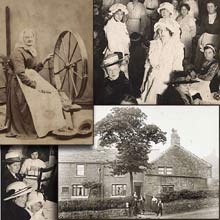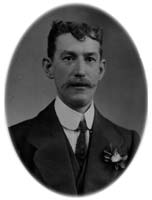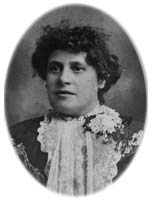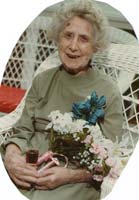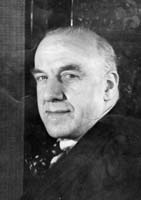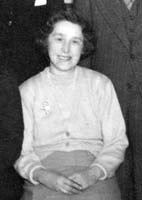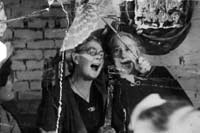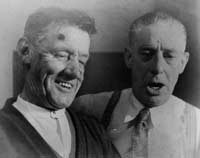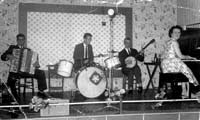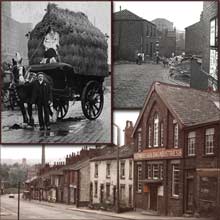
|
OUR MEMORIES & STORIES SUTTON AND KEARY LIVES The memories on the linked pages are from Norma Eaton (nee Keary) and are about the lives of her parents and maternal grandparents. This is Mary Eleanor's story (Norma's mother) Mary Eleanor Sutton (known as 'Nellie') was born 9th January, 1896 at 25 Piercy St., Ancoats; died 20th November 1995 at Chamber Mount, Chamber Road, Oldham. Mary Eleanor was married
on the 24th August 1922 at St. Paul's (CofE), Ashton Road, Oldham, to ~~~~~~~~~~~~~~~~~~~~ James Thomas Sutton was recorded on the 1891 census, in New Cross, Manchester, with his wife and their first baby, Edith. His occupation was that of a 'brass finisher'.
MARY ELEANOR SUTTON'S (NELLIE'S) STORY
Leather clogs were often wom both by adults and children. When the narrow strips of iron nailed to the soles of the clogs were struck sharply against the pavement, sparks flew. Walking across snowy or muddy ground, the same clog irons collected pads of snow or mud which formed an increasingly thickening block on the clog's base. "Cloggie Boggies" could make a small child into a tall child in ten minutes. Needless to say, clogs were very popular with the children and reputed to be extremely comfortable. An accidental kick from a child wearing a clog injured Nellie's ankle. lt became ulcerated and at the age of seven she vividly recollected attending the local sixpenny doctor's surgery to have daily dressings to her ankle. These visits were remembered vividly as the dressings were a very long painful process. As a result Nellie was left with what she described as a 'weak ankle' and to her shame was the only one of the family for whom shoes were ever purchased. Like many others in the area, the Sutton family lived at poverty level. Father's wages were barely sufficient to feed, clothe and house the large number of children. Toys were a rarity and only to be seen in the windows of the shops around Christmas time. Then they were only for the fortunate few. The children used their vivid imagination to create their toys from the bits of rubbish found in the streets. Old pram wheels together with a flat piece of wood made a 'bogey' to sit or lie upon and take a bumpy ride down the cobbled streets. A large clothes peg wrapped in a piece of rag became a doll, a broken piece of slate a hopscotch and Mother's washing line became, of course, a skipping rope. Whilst the factory in the next street manufactured both sweets and chocolates, rarely did any of the children living in Piercy Street, taste its products. The only confectionery issuing from the factory and available to the children was discovered when steam from the toffee vats found it's way out of the vents and down the outside drain pipes on the factory wall. Children would gather around the end of the cracked drain pipes, enjoying the warmth from the steam. Later as the steam increased and left the broken pipe, the cold air outdoors caused particles in the steam to solidify and a small flow of liquid toffee ran down the broken drainpipe. The children used their nails to scrape the dregs from the factory wall and suck the sticky mess from their fingers. The scarcity of food was so great that to have half an egg for a main meal was seen as an absolute luxury. Nellie's nickname of 'Eggy' arose from her daydreams of her favourite meal. lf one egg only remained for the family's main meal, then survival meant that this must be given to the only wage eamer in the family, their Father, James Sutton. The children tried hard to play unobtrusively whilst Father ate his meal. Should a little egg yolk be left upon his plate, and Nellie generously insisted that her father left this deliberately, the children would take tums to dip a piece of dry bread into the uneaten smear of egg . Another child would wipe the plate with a piece of bread to gather up any possible trace of the dripping left from the frying pan. There is no doubt that many experiences of childhood influenced Nellie's values in later life. The provision of food was always a priority with her. Physically she was so slender that when an adult, and Edith sewed dresses for her, the sewing patterns had to be adapted to take into account her lack of body fat. Many years later, when Nellie was a housewife and mother, and at a time immediately prior to the rationing of the second World War, Nellie remembered well the feelings resulting from the shortages of food occuring during her childhood and teens. Determined to do her utmost to prevent her present family experiencing these same feelings, Nellie regularly walked around Oldham Town Centre and Tommyfield Market, spending all her available cash, buying provisions that could be stored away and used when necessary. ln her concealed storage area under the bath, well secreted behind the bath panel , Nellie stocked sixty pounds of sugar, twenty pounds of tea, tins of fruit, condensed milk, dried fuit, syrup and jam, plus soap and soap powder for laundry purposes. Back in the time of Nellie's childhood and some years after the family's final removal from Ancoats, Manchester to Noble Street Oldham, Nellie had her thirteenth birthday. She was now of an age considered old enough to contribute to the family budget. Soon she was found a job working as a 'half timer' in the Cotton Mill. Nellie attended school in the momings and worked all the aftemoons as a 'Little Tenter' in the Cardroom of the Copster Mill about l mile away from her home. The Cardroom of the mill was a noisy dusty and extremely hot place to work. Often Nellie would think how lucky she was to attend school in the mornings rather than the afternoons, as did many of her friends. These children would begin work in the mill at 6 a.m. each morning and by 2 pm they often fell asleep whilst sitting at their school desks. Many quite severe canings were given by the Teachers for the children's 'lack of concentration'. Nellie's work at the Copster Mill ended when, on her way home from school one aftemoon, she was told that the Mill was on tire. Thinking of her precious work shoes and tea mug hidden in a comer of the Cardroom and anxious that her parents would be very angry with her for losing them, she began to run as fast as she could down Copsterhill, the long steep road to the Mill. The nearer Nellie got to the mill the thicker the smoke and flames grew. With her total concentration on her mission, Nellie failed to see the large broken kerbstone in her path. Her toe caught the kerb and with great force she fell forward onto the pavement. Her face and mouth caught the force of her fall and Nellie's front teeth permanently disappeared. Passers-by, helping her up from the pavement and trying to stem the blood, had great difficulty in both understanding her muddled words and physically preventing her running on towards the buming mill. The tragic death of her Mother in 1913 brought changes that affected the whole family. At that time Nellie was aged seventeen and she worked in the Cotton Mill on a full time basis. Her wages were those of a skilled worker. Edith, Nellie's eldest sister, now aged twenty one, left her job at the Monarch Mill and took charge of the care of the family. The youngest member of the family was a baby of nine months, a fair haired little girl named Madelene. The two girls, Emily and Nellie, remained working at their jobs in the Cotton Mills but were also allocated specific responsibilities in the family home. Emily was to attend to the cleaning, and Nellie was to be responsible for the shopping. Gathering the family together, their father very firmly told them of his decision that Edith was to be in complete charge of the home and she must be obeyed in all things. Edith also made her own firm rules relating to performance of tasks and conduct within the home. Her word was absolute and woe betides any family member who contravened or 'overlooked' any of her rules. Whilst rarely resorting to physical punishment, a word in Father's ear from 'our Edee' resulted in Father rigorously enforcing Edith's instructions. Wide-ranging rules were also made by Edith relating to family conduct and hygiene. From living room to bedroom they stretched. Rules must be obeyed whatever the age of the family member, whether they be wage earner or child. Even the family's posture was influenced; family should sit at the dining table with a perfectly straight back. This posture should not be relaxed until the meal was completed. Family meals must always be taken at the table. lf there were insufficient chairs, then the younger children must stand to eat. When meals were completed Edith's permission must be sought before anyone attempted to leave the table. Father must be given total respect and consideration. His meals were to be taken in patemal isolation and splendour. The children must not at any time intrude upon his meal nor his privacy. The rules for family hygiene were extremely strict. Each evening the girls must avoid the kitchen area whilst the boys had a complete strip wash. Only when the boys were safely upstairs and in their bed would the three girls take their turn to wash and launder their underwear. The underwear would be left to dry in the oven besides the banked up fire. As each girl possessed only one set of underwear, hopefully, it would dry sufficiently well to wear the following morning. When moming arrived the girls must of course, be first down stairs in order to be fully clothed before the boys left their bed. The girls must at all times sit neatly and tidily and not expose any part of their bodies or upper legs to the boys. Emily must never clean either the bedroom of their father nor that of the boys unless accompanied by Nellie. Brimstone and treacle was given weekly for regular 'cleansing of the blood'. Should headaches or stomach pains pose problems, Edith considered that 'the blood must need extra cleansing' and dosed the sufferer radically with Epsom salts. On occasions the herb, Penny Royal, was given to the girls for period pains. More often the sufferer was told to get up, do some housework and forget the pains. Discussion of 'personal issues' such as neighbourhood pregnancies, marital affairs or periods was actively discouraged and certainly must never be mentioned in front of the boys. In spite of all the difficulties, the children grew and the life of the family progressed. The eldest brother, Richard, married his girlfriend and soon had a son who they named Alan. Alan quickly became the baby of the family and he was included in all family activities. Mutual friends introduced Nellie, now aged 24, to Bill Keary aged 19, a cotton mill worker and a staunch and active member of his Trade Union. Despite active disapproval from Edith, who envisaged a future breakdown of the family group and a reduction in income, Nellie and Billie began their courtship. The day came when 'Billy' was taken by Nellie to meet, for the first time, not only her Father but also the lady who inspired such awe in Nellie and who was known to all the family as 'our Edee'. The news that the newcomer, Billy Keary, had actually had the courage to disagree with their Father delighted the lads of the family. He had achieved what they had wished to do for many years. The lads immediately decided to welcome Billy into their midst. Thus began the start of a life long friendship with all the brothers in the family. Billy Keary actually became the Manager of the lad's local football team, the organiser of family holidays, the family resource for advice concerning financial and work related problems and, with the help of his Mother, the first-aider. When Nellie and Billy later announced their engagement, Edith annoyed and very worried that the family was to lose another much needed source of income, told Nellie. "You have a good home here, however, if you think you can have a better one somewhere else, you can go right now." Edith's word was law. Nellie felt compelled to leave her home immediately. Billy took a very distressed Nellie to his home at 43 Prince Albert Street, Oldham and gave her into the kindly care of his Mother, Alice. Alice, worried both by Nellie's severe anxiety state and obviously poor state of physical health, immediately asked her doctor to visit. Following a thorough examination, Dr. Thompson told Alice and Billy that Nellie was suffering from 'Anaemia and Nervous exhaustion' Her condition was said to be related to years of malnourishment. Alice insisted that Nellie must leave her job and rest in bed. She immediately began to encourage the patient to try the nourishing soups and broths she so expertly made. It was some weeks before Nellie was fit to even think of her coming marriage to Billy. The wedding was to take place at St. Paul's Church, Ashton Road, Oldham. The local Church where, when a child, Nellie had attended school. All the Sutton family were invited to the wedding but, at the risk of invoking Edith's wrath, they declined. Only one younger brother braved the storm. Arthur later became Godfather to Nellie and Billy's child, Norma. HER MARRIAGE Following the wedding, Nellie and Billy lived with Alice at their home in Prince Albert Street and within a few weeks the boys in the family quietly began to visit. They enjoyed Billy's company and enjoyed even more the bread, soups and cakes made by Alice. ln due time, following the marriage of her sister Emily, Edith, Nellie and Billy were reconciled. Edith never again held the same amount of domination over her family. Nellie and Billy's purchase of the house at 88 Goddard Street, Oldham led to this address later becoming the focal point of the Sutton family's social life. With the onset of the Second World War, Bill and the Sutton lads converted the Cellar into an Air Raid Shelter for the use of the whole family. The cellar roof / living room floor was supported by old Pit props from the local Chamber Colliery. The family pooled their cash and sent Nellie to buy tea, sugar and tinned foods to stock the cellar's emergency food cupboards. Primus stoves, Heaters, Kettles and bunk beds all were added to improve comfort. At Christmas and party times, the Cellar/Air raid shelter became the family bar. Crepe paper decorations were draped around the beams. Chairs and beer crates for seating were arranged around the walls and a bar constructed in a corner. Some weeks prior to the festivities, Billy would open his Savings Club and each week members of the family would visit with a contribution. From the combined family savings, a wooden barrel of beer was purchased from a local off-licence. lt was allowed to cool and settle then, two days prior to Christmas Eve and the start of the festivities, the barrel was vented, when the bung on the top was removed. No beer was drawn from it until the evening of Christmas Eve. ln the meantime to keep the barrel cool, wet towels must be laid over the top. In spite of food rationing, a large piece of cheese was obtained from the same source as the beer. Sister Emily became supreme in creating jars of very strong pickled onions. These, with bread made by Alice, now known to all the family as 'Grandma Keary', helped the beer to flow with extra smoothness. Billy's cousin (Jack Brierley), his wife and daughter Monica, who was an expert, semi-professional pianist, travelled from their home in Knotty Ash Liverpool. The living room carpet was rolled back, and then the floor and the ceiling above the Cellar Bar shook, as Monica played the popular war time songs on Grandma Keary's piano and the family danced and jitterbugged. Bill Keary accompanied on the banjo, Madelene's husband, Norman Parsons, played the drums, Jack Brierley (Monica's father) played the washboard and anyone else played the Tambourines or 'Kazoos' purchased from Woolworths. Down in the cellar, Louie Brierley (wife of Billie's cousin), wearing long gold earrings and with a headscarf tied around her forehead, read the tea leaves in the used tea cups and told family fortunes whilst she sat in a little curtained booth in the cellar. Youngest sister Madelene and Eva Knott, (a family friend) both wearing appropriately low cut blouses, performed their roles as barmaids and served drinks from the bar. Edith and Emily had their glasses of Stout warmed by inserting a poker, previously heated to a glowing red in the large living room fire, whilst Nellie and her Sisters-in-law sipped glasses of war time sheny, or whatever Christmas drink the local Labour or Working Men's Clubs had been persuaded to sell. The aroma of strong wartime cheese and pickled onions mingled with the smell of beer from the barrel and empty bottles. Occasionally the smell of cigarettes took precedence, particularly when the Woodbines or John Players became scarce and the Turkish brand called 'Pasha' circulated. It is not surprising that at those times little was heard of the bombs falling on Manchester. The only interruption to the party came when Billy and Norman Parsons were called to leave by the sound of the Air Raid sirens calling them to attend their voluntary jobs as Air Raid Wardens (Air Raid Police). Throughout the year the Cellar Bar was opened on high days, holidays and any other time that events may require a party. Many times no excuse was needed. Perhaps some of the readers of this saga may remember a similar Cellar Bar functioning at number 24 Osborne Road, Oldham? Now you know where the idea was born ll!" Story and pictures contributed by Norma and Brian Eaton |
|
|||||||||||||||
